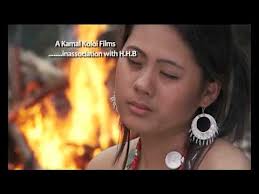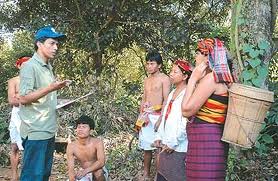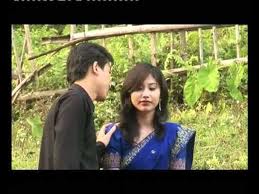Kokborok cinema
This is a collection of articles archived for the excellence of their content. Readers can send additional information, corrections, photographs and even Readers will be able to edit existing articles and post new articles directly |
This page has been curated and compiled by Mr. Mayang Tsumaar Dakaar Tephriimia Wai of Gyaagar, based on the writings of:
i)North-East cinemas: Interesting times/
By Utpal Borpujari, Deep-Focus, December 30, 2012 Utpal Borpujari
ii)Deep-Focus
iii)Ignore, and be ignorant. Cinema from the Northeast has verve.
By Utpal Borpujari Outlook
iv) Teresa Rehman
Tehelka/ Mishingrenaissance September 17, 2008
Some of these films enter into a unique dialogue with the audience. Women in remote corners of Tripura would start crying while watching Mathia, a 2004 film about witch-hunting, made in the Kokborok language. Villagers even started shouting “Witch!” whenever they saw its lead actor Meena Debbarma. The 132-minute long Mathia is one of the first full-length digital feature films in the country and the first one set in northeast India. The film has won much acclaim and Debbarma was a jury member for the 53rd National film festival.
Namrata Joshi Outlook
There is a fine moment in Yarwng (Roots), a new film from Tripura, where one character, a dispossessed tribal, asks a disturbing and prescient question: "If we keep giving away our land, how can you call us poor?" "It's the heart of my film," says filmmaker Father Joseph Pulinthanath. Yarwng, made in the local Kokborok language, is a lyrical film, shorn of any technical flourishes but brimming with compassion and humanity.
The film is about the people who inhabited the once-prosperous Raima valley of Tripura.
The original tribal inhabitants and the Kokborok language are in a minority now.
They were evicted after the valley was submerged when a dam came up on the Gumti river in 1976. "They had no land documents, were given no compensation, nothing was done for them," says Pulinthanath. It's a film on their desire for a home and their dreams about their lost land. It is also a tenderly etched love story— of Karmati and Wakhirai, who would perhaps have got married had the rushing waters not thrown their lives apart. "It is a protest on behalf of the excluded as well as a celebration of their spirit of survival in the face of upheavals," Pulinthanath says.
Yarwng will be the inaugural film of the Indian Panorama at the India International Film Festival in Goa this week. What's most notable about the film is that although it's in Kokborok, it has been made by a Malayali priest who hails from Kottayam. Father Pulinthanath, 42, has been living in the Northeast for 28 years now, of which the past 14 have been spent in Tripura. He chose to work with the Don Bosco Society in the Northeast more for the "challenges" and a "fascination of the unknown". The unknown has now become the familiar and hence the empathy—the film doesn't exoticise them, nor does it exploit or wallow in their poverty.
Still, a priest dallying with the camera is an intriguing prospect. "I don't believe in conventional church work. I wanted to enter deeper into the lives of people, connect with them, understand their problems and struggles, and cinema is a powerful medium for that," the Father explains. This is his second film. The first, also in Kokborok, Mathia (Bangles), was about the practice of witch-hunts which is even now prevalent in Tripura.
Outside Tripura, Pulinthanath's films have been confined to the festival circuit. The commercial possibilities are limited. "There is no possibility of returns, but that doesn't bother me. I made these films because I wanted to contribute to the culture and language of the region," he says. Bengalis, especially migrants from Bangladesh, form 70 per cent of Tripura's population now. The original tribal inhabitants and the indigenous Kokborok language have been reduced to a minority. "A cultural corpus is needed to help revive the language," says Pulinthanath.
The process of making the film was as basic and rudimentary as its simple narrative. Yarwng was made on a princely sum of Rs 26 lakh (collected from church sources) on digicam, and then blown up to 35 mm. It was shot in the interiors, in Isoraipara village, near Gandacherra township. "It's a most backward area, without electricity, water, high school or health centre," says Pulinthanath. Though the film used local actors and crew, technical support (camera and sound) came from Thiruvananthapuram. "Some of the actors were totally raw; they had not even seen a camera before. They were not acting at all, just doing what they were told to do," he says. Pulinthanath is reluctant to call Yarwng "his" film. "It's our film," he says emphatically, "it's about a community...and not about the individual who made it."





